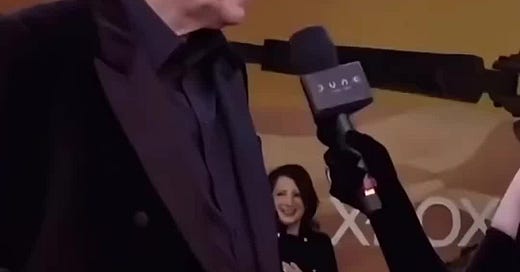This interview was originally published in March 2024!—Kate
Running influencer Kate Mackz featured White House Press Secretary Karoline Leavitt in a puff-piece video and podcast episode—but in 2025, there’s no such thing as being “apolitical.”
I get a lot of junket clips on my TikTok For You page, and as an OG Skins fan, I’ll stop to watch anything that features actor Dev Patel. He always proves delightful, and his most recent interview with creator Shiv Reddy was no exception. But it wasn’t just the pair’s playful banter that struck me in the clip. It was this specific exchange:
“My name is Shivani, and I am a TikTok content creator,” she says for the camera.
“Woo!” Patel replied enthusiastically. “You go girl.”
Just a few weeks ago, actor Stellan Skarsgard had a decidedly different response when being interviewed by Amelia Dimoldenberg.
“It’s such a TikTok question,” he says, when asked about his favorite day on set. “You want a question that has one short answer.”
“You could just say no,” she replies (perfectly, I might add).
 Tiktok failed to load.
Tiktok failed to load.Enable 3rd party cookies or use another browser
But Skarsgard’s attitude reflects a wider sentiment these days, especially by those in the entertainment journalism space. This idea that TV and film content creators are less legitimate feels like a re-mainstreaming of anti-influencer culture. It both ignores the fact that content creators do similar work, while also erroneously dismissing anyone as a “TikTokker” whenever they do something they don’t like (For instance, recent frustrations with questions about Timothée Chalamet kissing Zendaya in Dune cited “TikTokkers on red carpets” as the problem—when in reality, the person who asked that question is a British reality TV star and podcaster).
This obviously isn’t to excuse the decimation happening in journalism right now. But I asked to have a conversation with Reddy, who covers projects by and featuring South Asians, to show that our frustration is misdirected towards enthusiasts who are just looking for their way into a notoriously difficult industry.
“I went into content creation with the same kind of understanding of, there are going to be people that look at you a certain way or diminish what you do,” Reddy says over Zoom. “And at the end of the day, I'm not here to prove anything to anyone except myself.”
In this interview, we talk about the overlap between TikTok and traditional journalism, the space Reddy’s carved out for South Asian representation, and why—don’t worry—she’d never call herself a “critic.”
Why don't we start with the basics: who you are and how did you get started in entertainment journalism?
I started off with content creation because I just saw a bunch of projects that featured South Asian leads that came out around a very concentrated period of time. And I was like, there is no one talking about this online the way that it needs to be talked about. And I come from a background of photography, but before I went to college, I was a business economics major. I wanted to get a job in marketing. I've always had a fascination with social media, with my Instagram, since high school. But it has taken off the way that my TikTok has. So I don't think I ever started TikTok videos with the intention of being like, “I'm gonna be this huge creator.” That was not the goal. I just wanted to find my pocket of the internet where people would appreciate what I was talking about, and hopefully have a community that would tune into updates about projects that I was interested in and hear about it from my perspective.
Check out the full interview:
Welcome to the weekly scroll, a roundup of articles, links, and other thoughts from being on the internet this week! Ahead: The status of the TikTok ban, John Fetterman’s doomscrolling, and the person you should never trust in media.
What I’m consuming…
Keep reading with a 7-day free trial
Subscribe to Embedded to keep reading this post and get 7 days of free access to the full post archives.






